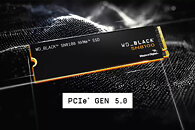
Kioxia Sampling UFS Ver. 4.1 Embedded Flash Memory Devices
Kioxia Corporation, a world leader in memory solutions, today announced that it has begun sampling new Universal Flash Storage (UFS) Ver. 4.1 embedded memory devices, reinforcing its leadership in high-performance storage. Engineered to meet the demands of next-generation mobile applications, including advanced smartphones with on-device AI, the new devices offer improved performance with greater power efficiency, in a small BGA package.
UFS Ver. 4.1 devices from Kioxia integrate the company's innovative BiCS FLASH 3D flash memory and a controller in a JEDEC-standard package. These new UFS devices are built with Kioxia's 8th generation BiCS FLASH 3D flash memory. This generation introduces CBA (CMOS directly Bonded to Array) technology—an architectural innovation that marks a step-change in flash memory design. By directly bonding the CMOS circuitry to the memory array, CBA technology enables major gains in power efficiency, performance and density.
UFS Ver. 4.1 devices from Kioxia integrate the company's innovative BiCS FLASH 3D flash memory and a controller in a JEDEC-standard package. These new UFS devices are built with Kioxia's 8th generation BiCS FLASH 3D flash memory. This generation introduces CBA (CMOS directly Bonded to Array) technology—an architectural innovation that marks a step-change in flash memory design. By directly bonding the CMOS circuitry to the memory array, CBA technology enables major gains in power efficiency, performance and density.























































